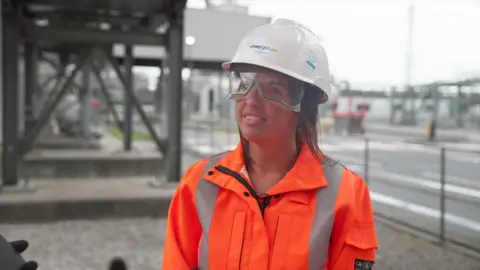Workers at the Vivergo Fuels bioethanol plant near Hull are currently facing an uncertain future as the facility prepares for its last scheduled delivery of wheat. This crucial delivery from Lincolnshire involves 20 tonnes of wheat destined for conversion into ethanol—a renewable fuel designed to reduce emissions when blended with petrol. However, this delivery signals a critical moment, as it is the final procurement from the site, raising concerns among staff regarding the plant’s operational viability.
The primary concern stems from a recent government decision to end a 19% tariff on US bioethanol imports. The owners of Vivergo Fuels, part of Associated British Foods (ABF), have indicated that this decision has jeopardized the future of the largest bioethanol facility in the UK, located at Saltend. Previously, Vivergo began discussions with its staff about a potential shutdown due to the uncertainty surrounding production.
Management at Vivergo Fuels has stated the urgent need for financial assistance from government officials. They assert that without such support, production may halt as soon as September 13. This could have a cascading effect, with predictions that approximately 4,500 jobs in the supply chain will be impacted, extending beyond the plant to include farmers who cultivate the wheat and truck drivers who facilitate its transportation.
The government has assured that it is actively engaged in discussions with Vivergo and is keen to explore options that protect jobs, livelihoods, and the broader supply chain. However, anxiety remains palpable among employees and their families. Some employees have voiced their frustration over the absence of clarity regarding their future employment and have expressed feelings of being in a state of limbo as they await decisions that impact their lives.
Among the workforce, Stacey Monkman, who has three years at Vivergo in the commercial and logistics departments, articulated the emotional toll of the ongoing uncertainty. She explained that while employees remain motivated to perform their duties, the unpredictability of their situation makes it challenging to maintain morale. The worries extend to the personal lives of the staff, with financial responsibilities weighing heavily on their minds.
In a similar vein, Nick Smalley, the production manager at Vivergo, emphasized the frustrations stemming from decisions made by higher authorities that lack input from the team. He underscored the importance of his workforce, urging for prompt action to avoid reaching a crisis point that may affect hundreds of lives, including his own responsibilities towards the team he leads.
The repercussions of potential plant closure extend far beyond the immediate workforce. Vivergo Fuels historically purchases over a million tonnes of British wheat annually, operating with more than 4,000 farms and sourcing from as many as 12,000 individual farms over the past decade. Farmers like Matt Pickering from Gainsborough highlight the significance of Vivergo as a key market for their wheat, which would be a substantial loss should the plant cease operations.
In addition to farmers, transport businesses such as Aghaul Limited, which recently delivered the last load of wheat to Vivergo, are bracing for the impact of reduced contracts and potential job losses. Managing director Mike Green remarked on the extensive network of individuals that could suffer as a result of a decision to close the plant, calling for government intervention to address the looming crisis.
Vivergo’s managing director, Ben Hackett, described the loss of the US tariff as a significant blow to the bioethanol market, dramatically affecting their customer base and operational capabilities. He has urged for government support to establish a clear framework that fosters demand for bioethanol while providing immediate financial assistance during the transitional period.
In light of these events, a government spokesperson has indicated the recognition of “significant challenges” the bioethanol industry faces. The continuous engagement with Vivergo aims to implement a supportive plan safeguarding jobs and ensuring supply chains remain intact. Formal discussions regarding financial help initiated last month signal the seriousness of the situation.
For those connected to the Vivergo Fuels plant, the anticipated decision from the government will be pivotal in determining the future viability of not only their jobs but the broader agricultural and transport networks that depend on the plant’s operations. Without decisive government action, the closure of Vivergo could prompt an economic ripple effect, echoing across various sectors reliant on the facility’s existence.












